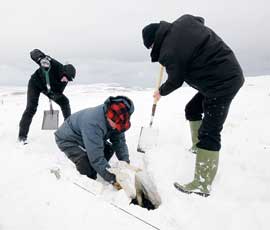Death toll rising as winter weather kills 25,000 livestock

More than 25,000 sheep and cattle are now believed to have perished in snowdrifts during the coldest March for 50 years.
The figures were obtained by Farmers Weekly as rules were relaxed to enable farmers in the worst-hit parts of Wales to bury dead animals on their farms.
Farmers are continuing to pull carcasses from snowdrifts expected to reveal more casualties as the weather improves.
So far, at least 19,910 sheep and 4,729 cattle have been killed, suggests an initial assessment of stock losses for the last three months compared to the same period in 2012.
Some 148,647 sheep carcasses were collected between January and the end of March, compared to 128,737 sheep carcasses collected during the same period in 2012.
Similarly, fallen stock collectors disposed of 82,883 cattle carcasses during the first three months of 2013 compared to 78,154 cattle carcasses during the same period last year.
For both sheep and cattle, the higher number of casualties this year is being blamed largely on heavy snow over the past 10 days which has seen livestock buried in drifts up to 20ft deep.
The initial assessment – which covers Great Britain and Northern Ireland – was carried out by the National Fallen Stock Company (NFSCo), which is helping to co-ordinate the disposal of dead animals.
However the eventual death toll is expected to be much higher.
The figures do not include unweighed containers and bags of lambs, which do not identify how many animals are inside.
The current statistics also largely exclude losses from the most badly hit regions, as the snow will still be masking dead animals.
Consequently, said NFSCo, these figures are the minimum. The data will be revised upwards as more data is received from collectors, it added.
NFSCo chairman Michael Seals paid credit to collectors working on behalf of the scheme in difficult conditions, saying NFSCo was discussing ways to help farmers in hard-hit regions.
Mr Seals also urged farmers to use NFSCo scheme collectors where possible to enable the most accurate figures on losses to be collated.
Doing so would also put farm businesses in the best position to receive hardship payments in light of already announced or potential government compensation packages, he said.
The government is obliged under EU law to ensure the safe disposal of fallen stock to safeguard both public and animal health.
This usually prevents farmers from burying dead animals on their land.
But the Welsh Assembly has given farmers in the worst-hit areas temporary permission to bury dead sheep, lambs and calves on their land.
The derogation includes farmers in Conwy, Denbighshire, Wrexham, Gwynedd, Flintshire, Montgomeryshire, and Radnorshire.
Farmers will be required to provide evidence that collectors were unable to access the farm.
They must also notify their local authority that a burial is taking place.
Details of the burial must be recorded in the farmer’s movement book, with tag numbers if appropriate and the burial site location.
The derogation will come into force at one minute after midnight on 3 April and will apply for seven days, after which the procedure will be reviewed.
In London, the bad weather was described as a severe blow by government ministers and officials who discussed the situation again on Tuesday (2 April).
DEFRA said it was keeping a close eye on the situation, but strict rules regarding the off-farm disposal of deadstock would remain in place – at least for the time being.
“We’ve relaxed rules on driver hours to allow extra time for essential deliveries of animal feed get through to farms,” said a DEFRA spokeswoman.
“We’ve also permitted farmers with red diesel in their tractors to help grit and clear snow from public roads to help communities during the bad weather.
“We have asked the National Fallen Stock Collectors to consider reduced costs for multiple collections of stock from the same farm.
“If exceptionally bad weather makes it very difficult for farmers to get carcasses to a vehicle, then disposal on site will be allowed.”
